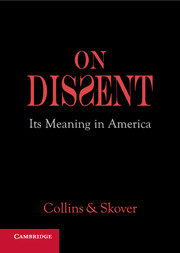Book contents
- Frontmatter
- Contents
- Informationis Personae
- Prologue
- Chapter I From Judicial Dissent to Peaceful Protest
- Chapter II From Civil to Uncivil Disobedience
- Chapter III The Vagaries of Violence
- Chapter IV Dissent, Inc.
- Chapter V Dissent and Law's Parameters
- Epilogue
- Notes
- Acknowledgments
- About the Authors
- About the Informationis Personae
- Select and Annotated Bibliography
- Index
Epilogue
Published online by Cambridge University Press: 05 May 2013
- Frontmatter
- Contents
- Informationis Personae
- Prologue
- Chapter I From Judicial Dissent to Peaceful Protest
- Chapter II From Civil to Uncivil Disobedience
- Chapter III The Vagaries of Violence
- Chapter IV Dissent, Inc.
- Chapter V Dissent and Law's Parameters
- Epilogue
- Notes
- Acknowledgments
- About the Authors
- About the Informationis Personae
- Select and Annotated Bibliography
- Index
Summary
The noble title of “dissident” must be earned rather than claimed; it connotes sacrifice and risk rather than mere disagreement, and it has been consecrated by many exemplary and courageous men and women.
– Christopher HitchinsIn the annals of Anglo-American dissent, few have earned as much respect and ridicule as Thomas Paine. Born in 1737, he was a patriot to the colonies and a traitor to the Crown. He valued constitutional government, yet had a radical bent. He believed in God, but detested organized religion. He was allied with the great men and ideas of his day, yet often kept a skeptical distance from both. Others were willing to declare their grievances, but this British citizen demanded nothing short of independence from the motherland.
Paine's Common Sense, published in the winter of 1776, has been hailed as “the single most influential political work in American history.” An astonishing 150,000 copies of the 2-shilling pamphlet, carrying rousing messages about rights and revolution coupled with broadsides against monarchical rule, were snatched up in its first few months. Common Sense took its message to the common folk; no less a figure than General George Washington thought the work had produced “a powerful change…in the minds of many men.” Paine wrote with “a rage and a fury that none of the founding fathers ever expressed. He spoke out of a deep anger shared by…artisans, shopkeepers, traders, and petty merchants.” Little wonder, then, that his tract “did not merely change minds, it inflamed passions.” The rest is history, both glorious and ruinous.
- Type
- Chapter
- Information
- On DissentIts Meaning in America, pp. 129 - 134Publisher: Cambridge University PressPrint publication year: 2013



